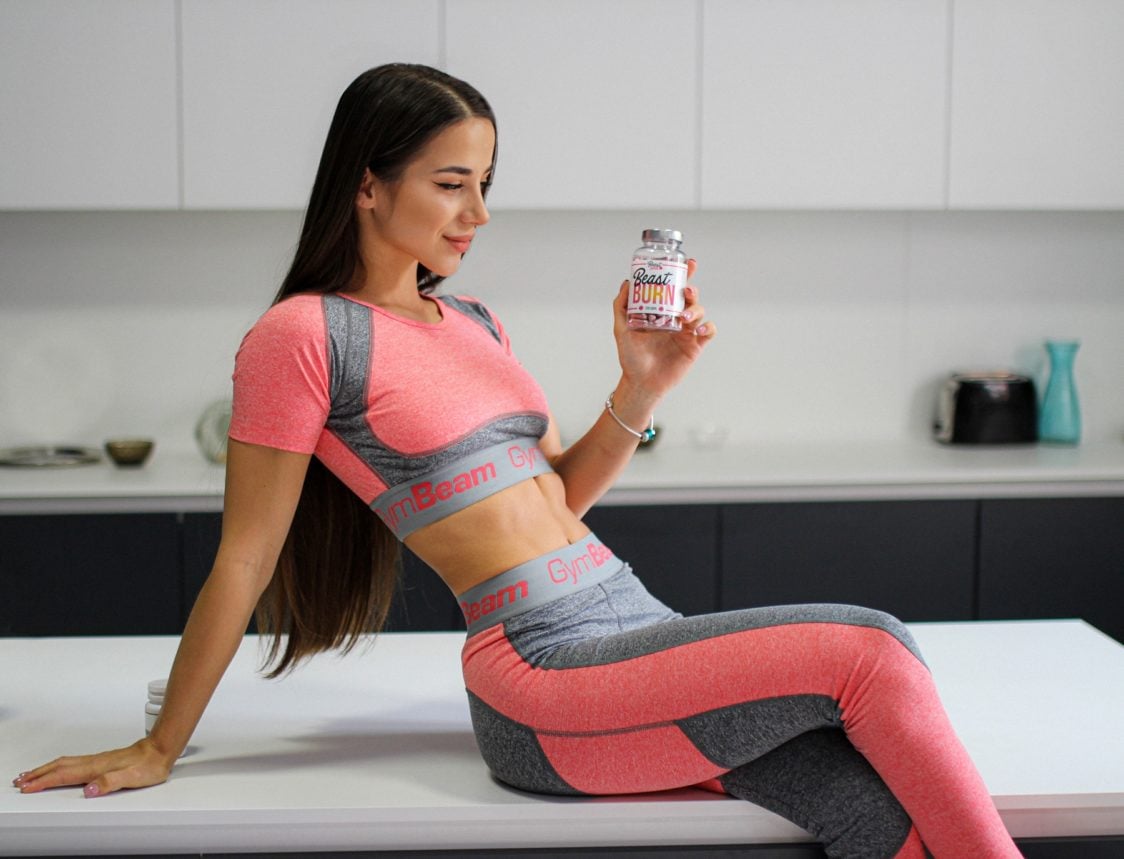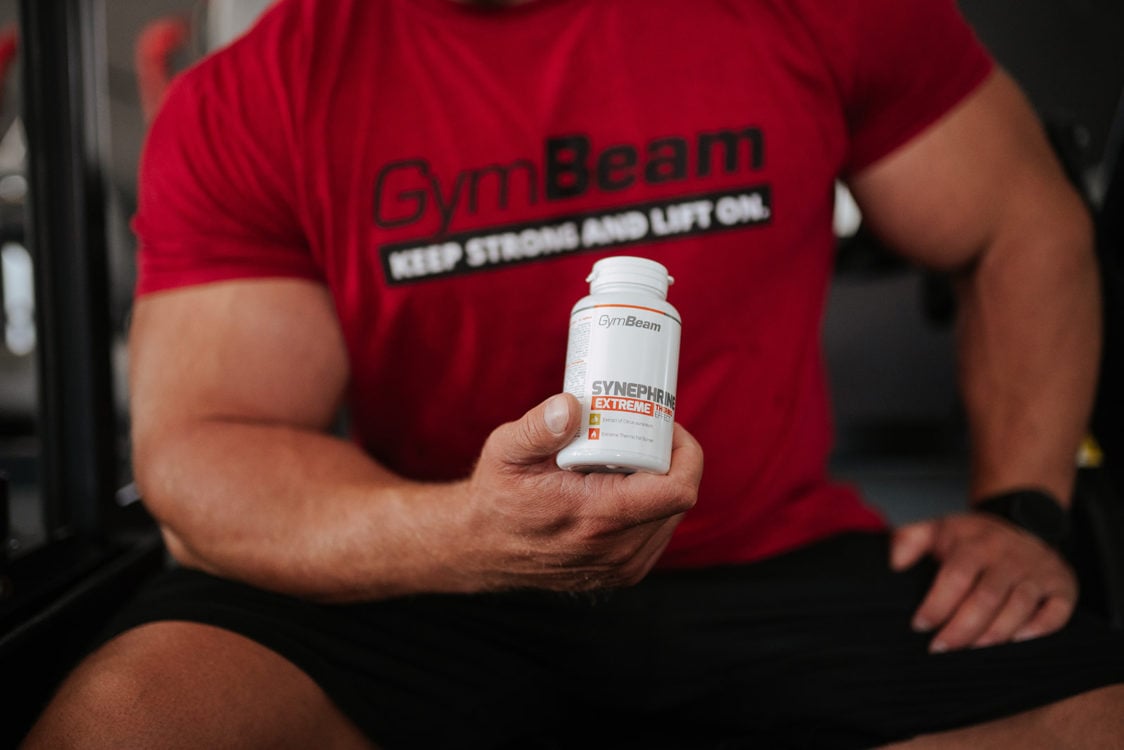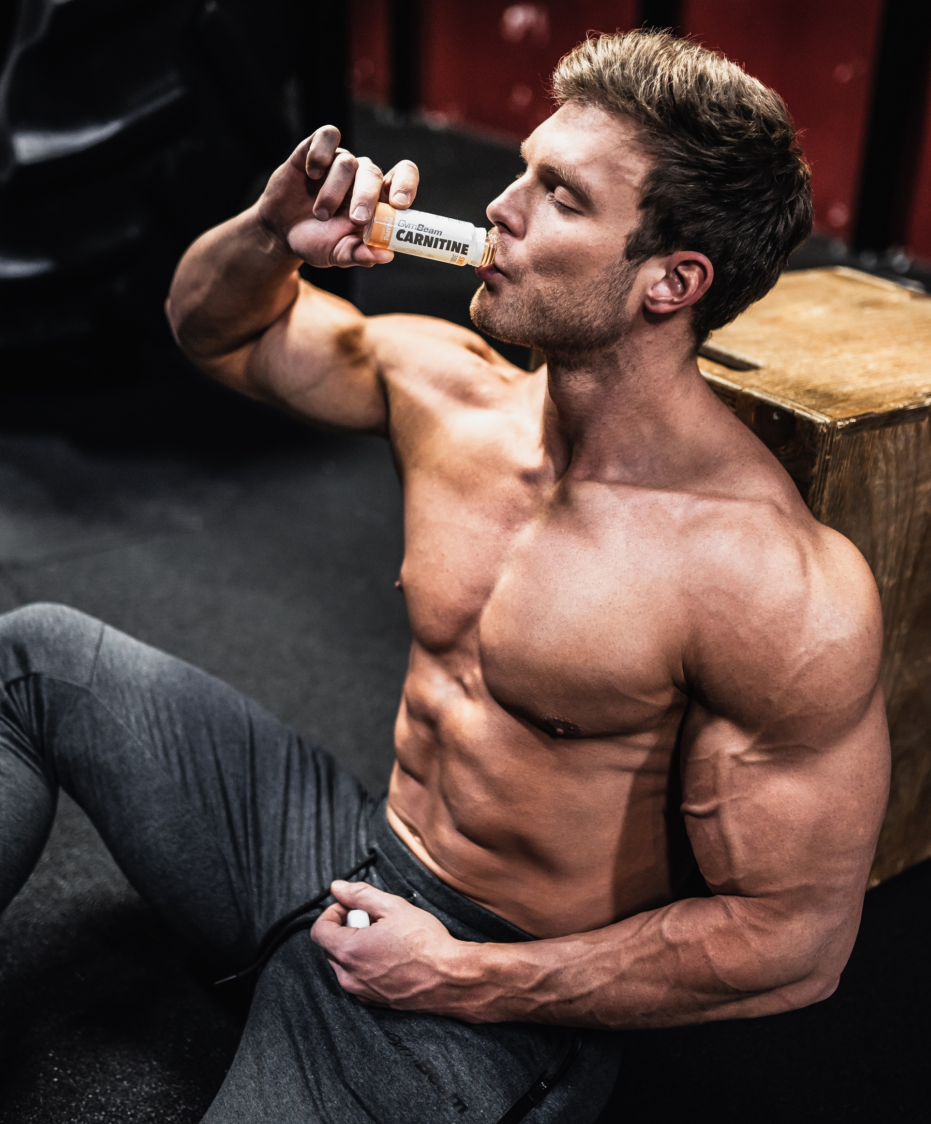Table of Contents
You started working on losing weight, but after a few weeks you realized that it wouldn’t just happen on its own? You are not alone. You may have wondered if there was a magic pill that would make it easier for you to lose weight. If you are expecting miracles, we will probably disappoint you. If weight loss were so easy, and it would just happen without any effort or change in life, we would probably all be slim. However, you may be pleased with the fact that there are substances that can make your efforts more effective and help you achieve your goals more quickly. We call them fat burners and in today’s article we will take a closer look at them. We will talk about what fat burners should contain, what science says about the (in)effectiveness of individual substances and what to pay attention to when using them.
What is a fat burner?

Fat burners are dietary supplements that are said to increase weight loss and fats oxidation during exercise, or otherwise support lipid metabolism. However, there are many substances that are referred to as fat burners, although there are virtually no studies to confirm their effectivity. It is all the more important in this case to look at ingredients contained and select substances with a proven effect. [1]
In accordance with the ingredients, you can then choose fat burners that contain only one specific active substance, or opt for a complex fat burner that contains more than one substance. In this case, the individual substances can also have a synergistic effect. Good examples are caffeine, synephrine or green tea extract. You also need to decide if you want your fat burner to contain stimulants, such as caffeine, or not. [2]
What to expect from a fat burner?
What a fat burner can do
- boost the organism before exercise
- help the body use fat as fuel
- increase thermogenesis – more heat production requires more energy = more calories burned, but also more sweating
- thanks to bigger excitement, zeal and concentration, it helps you to achieve more intense exercise, which means you burn more calories
- reduce appetite
What a fat burner can’t do
- burn hundreds of calories a day for you even if you don’t do anything
- lose weight painlessly for you without changing your current lifestyle
Quite simply – a fat burner can be a good helper, but it won’t do all the work for you. If you are not in a caloric deficit, and you don’t do anything, even the best fat burner will not help you lose weight. However, if you make a few changes in your lifestyle, it can help you lose weight and make the overall process more enjoyable, and even faster.
You might be interested in these products:
What substances can be found in fat burners?
Caffeine
Caffeine is the most commonly used stimulant worldwide, which is why we will focus on it in more detail. It even has several possible positive effects that can be used in connection with your efforts to burn fat. After its consumption, dopamine is released in the body, which can improve mood or cause euphoria. However, with long-term use, it can “only” make it hard to fall asleep. In connection with weight loss, you will certainly be interested in its thermogenic effect, which leads to a higher number of calories burned due to increased heat production. At the same time, it also increases blood pressure, heart activity and stimulates the body. This is also the reason why people with higher blood pressure should be careful about their caffeine intake. In addition, with long-term consumption, caffeine can also ensure that fatty acids, which the body uses as fuel, can be released by subcutaneous adipose tissue. [3]

If you do not take caffeine regularly, whether in coffee, tea, energy drinks or food supplements, a 100 mg intake will be enough for you to start with. However, for fat burning, a single amount of 200 mg is usually used. At higher doses, such as 500 mg, there may also be an increase in strength. Endurance and team athletes or people who do high-intensity sports can thus also benefit from higher doses.
In general, however, it can be said that the recommended amount is between 3-6 mg/kg body weight. However, according to EFSA, a healthy 70 kg person should not take more than 200 mg of caffeine at a time. If you overdose on caffeine, you may experience insomnia, irritability, dizziness, palpitations, as well as vomiting or diarrhoea. [4] [28]
The properties of caffeine has also been confirmed by science. For example, studies show that caffeine can increase the rate of resting metabolism by 3-11% for up to three hours – in this particular case participants were given a dose of 200 mg of caffeine. Does it seem like a significant acceleration to you? So let’s have a look at a specific example to get a better idea about it. [5]
If you are a woman who is 30 years old, 170 cm (5’7”) tall and weighs 70 kg (154 lbs), your resting metabolism is approximately 1452 kcal. In reality this means that the body needs at least 60.5 kcal per hour to maintain all functions. If this woman took part in the study, took 200 mg of caffeine and her resting metabolism was increased by 3-11% for 3 hours, it would mean that her expenditure would increase by approximately 5.5-20 kcal without doing anything.
If this woman adhered to the maximum recommended limit for caffeine intake for her weight, she could take another 200 mg dose of caffeine during the day. If we count the maximum possible result according to the study, she would burn 40 kcal per day just thanks to caffeine. Just to give you an idea – 100 ml of semi-skimmed milk has 47 kcal, so if she, together with caffeine, had some coffee with milk, the acceleration of resting metabolism would probably not even cover milk calories. However, if this woman exercised after taking caffeine, she could achieve getting more calories burned.
So if you want to use caffeine to burn fat, you shouldn’t expect it to do all the work for you. Instead, try to take advantage of the fact that it can boost your energy, so you can exercise more intensely, thus increasing the number of calories burned.
A single dose of caffeine should be around 200 mg. [4]
Synephrine
Synephrine (specifically p-synephrine) is a compound that is found, for example, in citrus fruits. It has an effect on dopamine, adrenaline and norepinephrine in the body, which can also affect fat burning. It is also associated with an increase in metabolic rate, an increase in lipolysis and basal metabolism. Its effects have as well been confirmed by science. One study focused on caloric expenditure and concluded that after ingestion of 50 mg of p-synephrine, caloric expenditure increased by an average of 3.7% over the next 75 minutes. [6–7]
Its properties are also confirmed by the findings of a review study, which includes 20 other studies and approximately 360 subjects, in which respondents received an extract of bitter orange (Citrus aurantium), in which the main alkaloid is p-synephrine. These respondents showed an increase in resting metabolism, energy expenditure, and, when administered for 6–12 weeks, it also demonstrated a slight weight loss. It has also been confirmed that synephrine can help reduce appetite. [7–9]
And as mentioned above, synephrine works effectively in a combination with caffeine. Thanks to the synergistic effect, you can combine them to slightly increase the number of calories burned during training.
Recommended single dose is 10-20 mg, which should be taken 3 times a day. However, studies often work with a single dose of 50 mg. [5]

Green Tea Extract (EGCG)
EGCG is the major catechin in green tea. It helps increase the amount of norepinephrine in the body through certain processes, which promotes breaking down fat. The advantage is that in addition to EGCG, green tea also contains caffeine, and these two substances act synergistically. The effect of EGCG is also confirmed by many studies which found that it helps to increase energy expenditure and fat oxidation. [10–11]
However, there are also studies that have looked at the direct effect of EGCG together with caffeine on weight loss. The results show that daily consumption of green tea containing doses of 100-460 mg EGCG together with 80-300 mg caffeine for at least 12 weeks resulted in statistically significant weight loss and a reduction in body fat percentage.[12]
Significant effects are achieved at a daily dose of approximately 400-500 mg EGCG. [29]
Conjugated linoleic acid (CLA)
CLA, or conjugated linoleic acid, is well known among people trying to lose weight because it is often associated with the ability to reduce appetite, increase metabolic rate, and stimulate breaking down fat. We can say for sure that it helps maintain normal blood cholesterol levels, which can have some effect body weight. However, the studies differ in concluding whether CLA has a significant effect on weight loss. Any differences observed between the groups were usually minimal. [13–14]
When supplementing CLA, the dose of this substance should be in the range of 3200-6400 mg. [15]

L-carnitine
L-carnitine can again be considered as a substance that is associated with the ability to burn fat. However, for a correct understanding, we should explain on what principle it works. In the body, it acts as a “carrier” that transports fat (fatty acids) to the cells, where it is burned for energy. That means that if there is a sufficient amount of it in the body, it helps fat metabolism, which can ultimately help lose weight. People who avoid consuming animal products should especially focus on the intake of l-carnitine, as those products are the source of this amino acid.

Regarding scientific research that focuses on the effect of l-carnitine on weight loss, the results differ. According to a systematic review of meta-analyses, which included 9 studies, the groups of people treated with l-carnitine lost significantly more weight than the control groups. Accordingly, there is another meta-analysis involving 37 controlled studies that also confirms the modest effect of l-carnitine on weight loss. Another study in which l-carnitine was administered to obese women half an hour before walking did not show a statistically significant difference in weight loss between the group receiving the substance and the control group. [16–17] [19]
Another research has shown that with higher levels of carnitine in the muscles, there was a reduction in the use of glycogen stores during low-activity exercise (50% VO2max). During more intense exercise (80% VO2 max), muscle lactate was reduced in connection with carnitine. In addition, the study has shown that it can help to increase performance by 11% (studied for 30-minute-long exercise), which can increase the amount of burned calories. However, it should be noted that long-lasting supplementation is needed to increase carnitine levels in the muscles, ideally at least a month. [18]
The usual dose of carnitine is in the range of 500-2000 mg. However, the above-mentioned studies worked with higher doses. [20]
Other substances found in fat burners

In addition to the above-mentioned substances, other ingredients can be found in fat burners, which it contains also for a reason: [21–27] [30]
- Black pepper – helps to warm up the body, improve the absorption of other substances, and thus the overall effect of the fat burner
- Capsaicin – helps warm up the body, can reduce appetite
- Ginger extract – ginger generally helps increase thermogenesis
- Bromelain – pineapple extract – has antioxidant and anti-inflammatory effects
- Chitosan – can help with weight loss by being able to block the absorption of fat and cholesterol from food
- Theacrine – helps increase concentration and motivation
- Chromium – can help reduce appetite, has the effect of maintaining normal blood glucose levels
- Tyrosine – an amino acid that is involved in the production of norepinephrine and dopamine (their deficiency can lead to stress and inattentiveness)
- Green coffee extract – contains chlorogenic acid, which can reduce the risk of diabetes
- Vitamins B6, B12 – have an effect on metabolism, which is important for energy production, on nervous system, and they also help reduce fatigue and exhaustion
How to choose the best fat burner?
Most fat burners work primarily by boosting you up before exercise, which gives you more energy to exercise and burn more calories. For this reason, it is good to try to choose fat burners that contain some stimulant, such as caffeine. In addition, it acts synergistically with synephrine and green tea extract. So if you find caffeine together with these substances in your fat burner, it is definitely an effective combo. However, do not exceed the maximum recommended daily use of caffeine. This could have a negative effect on the quality of your sleep, which could ultimately sabotage weight loss. The fat burner will make your body sweat more.
L-carnitine supplementation is also a good idea, especially if you are avoiding animal products. In order to get the most out of carnitine, it is necessary to supplement it for a long time because the level of carnitine in the muscles will increase only after about a month of use. In fat burners, you will often find other listed substances that can support its effects (for example, increase the thermogenesis or absorption of the fat burner). For dosage and directions for use, follow the recommendations on the product packaging.
What is the lesson?
If you decide to start using a fat burner, always keep in mind that it is not a magic pill that will make you slim without you having to do anything. The key to weight loss is always a caloric deficit, it won’t work without it. You should also not forget about physical activity. If diet and exercise is not a problem for you, and yet you are still looking for something to support your efforts to reduce the percentage of body fat, then a fat burner can be a great choice. It can boost you up, improve your concentration, motivation, and thus increase the number of calories burned during training. It usually works more like a mental and physical boost, but its very effect without subsequent physical activity is unfortunately not as great as most people expect.
Do you also use fat burner to increase your calorie burn during exercise? If so, share your experience with us, and if you liked the article, don’t forget to share it with your friends. Maybe it can help them streamline their efforts to lose weight.
[1] A. E. Jeukendrup, R. Randell – Fat burners: nutrition supplements that increase fat metabolism – https://doi.org/10.1111/j.1467-789X.2011.00908.x
[2] Sara Dean a kol. – The Effects of EGCG on Fat Oxidation and Endurance Performance in Male Cyclists – https://www.researchgate.net/publication/41530924_The_Effects_of_EGCG_on_Fat_Oxidation_and_Endurance_Performance_in_Male_Cyclists
[3] Fat loss guide – https://examine.com/stacks/fat-loss/
[4] Caffeine – https://examine.com/supplements/caffeine/
[5] P Koot, P Deurenberg – Comparison of changes in energy expenditure and body temperatures after caffeine consumption – https://pubmed.ncbi.nlm.nih.gov/7486839/
[6] Synefrin – https://examine.com/supplements/synephrine/research/#obesity-and-fat-mass_metabolic-rate
[7] Sidney J Stohs a kol. – Effects of p-synephrine alone and in combination with selected bioflavonoids on resting metabolism, blood pressure, heart rate and self-reported mood changes – https://pubmed.ncbi.nlm.nih.gov/21537493/
[8] S Haaz, KR Fontaine a kol. – Citrus aurantium and synephrine alkaloids in the treatment of overweight and obesity: an update – https://pubmed.ncbi.nlm.nih.gov/16436104/
[9] Kaats GR, Leckie RB, Mrvichin N, Stohs SJ – Increased eating control and energy levels associated with consumption of bitter orange (p-synephrine) extract: a randomized placebo-controlled study – https://doi.org/10.2147/NDS.S136756
[10] M.S.Westerterp-Plantenga – Green tea catechins, caffeine and body-weight regulation – https://doi.org/10.1016/j.physbeh.2010.02.005
[11] A G Dulloo 1, J Seydoux, L Girardier, P Chantre, J Vandermander – Green tea and thermogenesis: interactions between catechin-polyphenols, caffeine and sympathetic activity – https://pubmed.ncbi.nlm.nih.gov/10702779/
[12] Lucía Cristina Vázquez Cisneros – Effects of green tea and its epigallocatechin (EGCG) content on body weight and fat mass in humans: a systematic review – https://pubmed.ncbi.nlm.nih.gov/28627214/
[13] J Nutr Biochem – Antiobesity Mechanisms of Action of Conjugated Linoleic Acid – https://www.ncbi.nlm.nih.gov/pmc/articles/PMC2826589/
[14] Leah D Whigham 1, Abigail C Watras , Dale Schoeller – Efficacy of conjugated linoleic acid for reducing fat mass: a meta-analysis in humans – https://pubmed.ncbi.nlm.nih.gov/17490954/
[15] Conjugated Linoleic Acid – https://examine.com/supplements/conjugated-linoleic-acid/
[16] M Pooyandjoo a kol. – The effect of (L-)carnitine on weight loss in adults: a systematic review and meta-analysis of randomized controlled trials – https://pubmed.ncbi.nlm.nih.gov/27335245/
[17] RG Villani, J Gannon a kol. – L-Carnitine supplementation combined with aerobic training does not promote weight loss in moderately obese women – https://www.researchgate.net/profile/Peter_Rich4/publication/12458039_L-Carnitine_Supplementation_Combined_with_Aerobic_Training_Does_Not_Promote_Weight_Loss_in_Moderately_Obese_Women/links/5538b9b30cf2239f4e79b383/L-Carnitine-Supplementation-Combined-with-Aerobic-Training-Does-Not-Promote-Weight-Loss-in-Moderately-Obese-Women.pdf
[18] Kent Sahlin – Boosting fat burning with carnitine: an old friend comes out from the shadow – https://www.ncbi.nlm.nih.gov/pmc/articles/PMC3099008/
[19] Nasir Talenezhadab a kol. – Effects of l-carnitine supplementation on weight loss and body composition: A systematic review and meta-analysis of 37 randomized controlled clinical trials with dose-response analysis – https://doi.org/10.1016/j.clnesp.2020.03.008
[20] L-Carnitine – https://examine.com/supplements/l-carnitine/
[21] Black Pepper – https://examine.com/supplements/black-pepper/
[22] Mansour – Ginger consumption enhances the thermic effect of food and promotes feelings of satiety without affecting metabolic and hormonal parameters in overweight men: A pilot study – https://www.ncbi.nlm.nih.gov/pmc/articles/PMC3408800/
[23] Bromelain – https://examine.com/supplements/bromelain/
[24] Andrew B Jull a kol. – Chitosan for overweight or obesity – https://doi.org/10.1002/14651858.CD003892.pub3
[25] Chrom – https://examine.com/supplements/chromium/
[26] L-Tyrosine – https://examine.com/supplements/l-tyrosine/
[27] Commission Regulation (EU) No 432/2012 of 16 May 2012 establishing a list of permitted health claims made on foods, other than those referring to the reduction of disease risk and to children’s development and health – https://eur-lex.europa.eu/eli/reg/2012/432/oj
[28] Schneiker, K. T. a kol. – Effects of Caffeine on Prolonged Intermittent-Sprint Ability in Team-Sport Athletes – https://journals.lww.com/acsm-msse/Fulltext/2006/03000/Effects_of_Caffeine_on_Prolonged.25.aspx
[29] Green Tea Catechins – https://examine.com/supplements/green-tea-catechins/
[30] Chitosan – https://www.webmd.com/vitamins/ai/ingredientmono-625/chitosan
[31] Pilou L H R Janssens a kol. – Capsaicin increases sensation of fullness in energy balance, and decreases desire to eat after dinner in negative energy balance – https://pubmed.ncbi.nlm.nih.gov/24630935/
[32] Shengxi Meng – Roles of chlorogenic Acid on regulating glucose and lipids metabolism: a review – https://pubmed.ncbi.nlm.nih.gov/24062792/


Add a comment